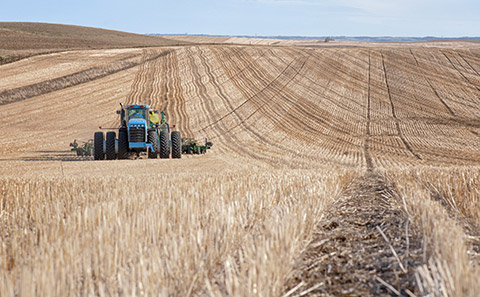Food security in developed countries shows resilience to climate change

A study by the University of Southampton has found that market forces have provided good food price stability over the past half century, despite extreme weather conditions.
Research into US wheat commodities by economists at Southampton, in collaboration with UCL, also suggests high uncertainty about the state of future harvests hasn’t destabilised the market.
Findings are published in the Journal of Economic Dynamics and Control.
Wheat is an important crop in the United States used for food production. A small fraction becomes animal feed and the crop isn’t used to generate biofuel. The main buyers of wheat are flour mills, food processors, and direct consumers.
The researchers analysed data on American wheat production, inventories, crop area, prices and wider market conditions from 1950 to 2018, together with records of annual fluctuations in the weather for the same period. This showed strong evidence of an increase in weather and harvest variability from 1974 onwards.
“Before the mid-70s, oil was the dominant driver of wheat price fluctuations in the US, but after this point we see a much stronger influence coming from a wider set of factors that includes weather and food consumption,” explains lead author Dr Vincenzo De Lipsis of the University of Southampton.
“Extreme weather events, such as droughts and floods, are becoming more frequent and intense across the world due to climate change. Understanding the impact of this variability on food commodity prices is crucial, as it could have serious implications for food security.”
The authors found that in the US the market system around wheat has remained competitive, functioning well and adapting to the new uncertain climate conditions. The potential for weather fluctuations to adversely affect wheat prices has increased, but in reality this hasn’t been passed on to the market. Wheat prices remain relatively stable, along with the price of associated goods.
The researchers found that this is mainly due to farmers and agricultural industries providing a buffer, smoothing out any bumps in the supply of grain to retailers and consumers, thus reducing shocks to the market that poor harvests may cause. This has been achieved by investment in substantial storage facilities, modern infrastructure and good transport links.
According to the study, the US wheat sector has demonstrated remarkable resilience and flexibility in adapting to the ever-increasing unpredictability of the climate and harvest by modifying its inventory management. At the same time, there is no indication that the wheat market is vulnerable to excessive volatility from the related financial futures market, which can often emerge in commodity markets in response to increased uncertainty regarding future production capacity.
Commenting on what policymakers can take from the research, Dr De Lipsis says: “We have shown that market forces provide a powerful stabilising mechanism to counter the increased variability in weather and harvest observed in the last half a century.
“The market mechanism is one of the most effective instruments that governments have available for climate change adaptation and food security. But for this to work effectively, we need a combination of factors in place: a well-functioning competitive commodity market, a modern infrastructure with extensive transport networks, sufficient food storage capacity and a liquid futures market.
“However, while the system in the US continues to be robust, it’s hard to predict if storage mechanisms will work equally well if faced with unprecedented levels of weather variability – the kind of extreme events that can potentially disrupt the transport network and the very infrastructure on which it is based.”
The authors acknowledge that stability is easier to achieve in developed and more affluent countries, but say that their results underscore the need to prioritise investment in these key areas in developing regions to ensure a reliable and secure food supply in the future.